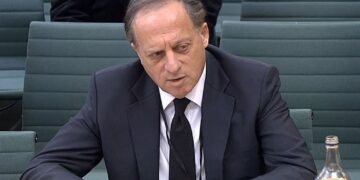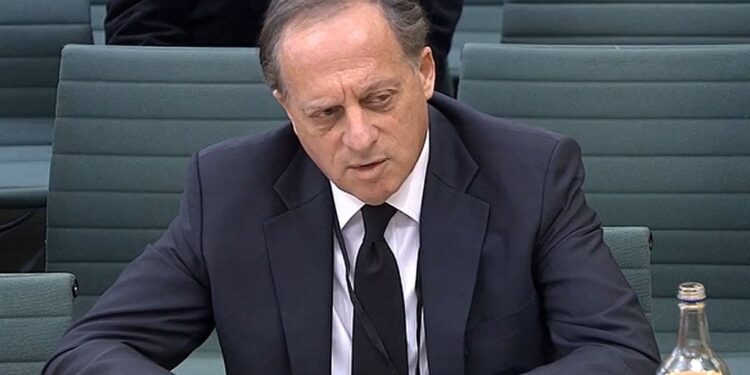The BBC’s chairman on Friday announced his resignation after his involvement in a loan for then-UK prime minister Boris Johnson raised questions about the broadcaster’s vaunted impartiality.
Britain’s Conservative government has long been accused of seeking to muzzle the publicly funded BBC, and the appointment of Richard Sharp — a wealthy past donor to the party — was denounced by opposition parties at the time.
The appointment of the BBC chair lies in the gift of the government. It only emerged later that Sharp had acted as a go-between to facilitate the £800,000 ($1 million) loan for Johnson.
Sharp — formerly a boss of Johnson’s successor Rishi Sunak at investment bank Goldman Sachs — denied any wrongdoing but said he was stepping down to avoid becoming “a distraction from the Corporation’s good work”.
However, Sharp’s close past ties to the Conservatives had already served as a distracting controversy for both the broadcaster and the government.
Last month, those ties were angrily raised by critics when the BBC suspended former England star Gary Lineker from its flagship football highlights show.
Lineker, on Twitter, had accused the Sunak government of using Nazi-era rhetoric in promoting its hardline immigration policies.
Lineker was hurriedly reinstated by the Sharp-led board after other presenters refused to work, throwing the BBC’s sports schedule across TV and radio into chaos.
Culture Secretary Lucy Frazer thanked Sharp for his service, as the government began the delicate hunt for a successor to one of Britain’s highest-profile roles when he leaves at the end of June.
Sunak has already had to find a new deputy prime minister after Dominic Raab was forced out last Friday after another inquiry found him guilty of bullying civil servants.
Lineker waded in anew to argue the government should not get to choose the BBC chair. “Not now, not ever,” he tweeted.
But Sunak refused to rule out another political appointee, telling reporters that he would not “prejudge” the recruitment process.
‘Lost the dressing room’
Opposition Liberal Democrat leader Ed Davey said the BBC was being “dragged through the mud” by the Conservatives.
“Everything Conservative politicians touch turns into a mess. They are not fit to govern our great country,” he said, ahead of British local elections next Thursday.
“Boris Johnson should never have been allowed to appoint Richard Sharp in the first place, and what’s worse is Rishi Sunak didn’t show leadership by sacking him.”
Sharp “failed to disclose potential perceived conflicts of interest” to a committee of MPs who were vetting his appointment by Johnson in early 2021, the inquiry by a senior lawyer found.
“There is a risk of a perception that Mr Sharp was recommended for an appointment because he assisted… the former prime minister in a private financial matter,” lawyer Adam Heppinstall found.
In February, the same committee of MPs accused Sharp of “significant errors of judgement” for not disclosing his involvement in the loan.
While he was being considered for the BBC job, Sharp in late 2020 put Johnson in contact with a distant cousin of the prime minister who extended him the credit facility.
Sharp has denied he got the job as a quid pro quo for helping out the cash-strapped Johnson but announced his resignation hard on the heels of Heppinstall presenting his report to Sunak’s government.
He acknowledged breaching conflict-of-interest rules for top UK officials but said it was “inadvertent and not material” to his appointment to the BBC.
“Nevertheless, I have decided that it is right to prioritise the interests of the BBC,” he said in a statement.
Michelle Stanistreet, general secretary of the National Union of Journalists, bade Sharp good riddance.
“He had lost the dressing room, he had lost the respect of senior figures in the broadcasting industry and besmirched the reputation of the BBC,” she said.
By AFP









